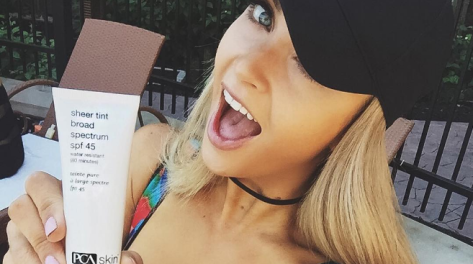Social media is a total grey area when it comes to advertising. While the advertised posts integrated into your timelines by Instagram, Twitter, and Facebook are clearly marked (as required by laws in most jurisdictions), the celebrities and influencers you follow haven’t needed to clearly denote paid posts and advertisements until recently.
With users like Scott Disick nearing 18 million followers, his Instagram page proves a greater advertising opportunity than a majority of magazines and TV programs. And taking advantage of that opportunity will cost companies like weight loss shake manufacturers, Bootea, somewhere in the ballpark of $25,000 per post (which will be deleted after a few weeks).
 While a seasoned user may be able to easily discern a sponsored, the US Federal Trade Commission laws on paid posts on personal social media channels have been fairly vague and have gone unenforced. The 2010 version of the FTC’s FAQ page (which was the latest version until earlier this year) previously only mentioned the relationship between the brand and the poster must be “clearly and conspicuously” disclosed.
In June the organization updated their rules and regulations, going further into detail about the exact protocols that should be followed when posting sponsored content, answering questions from “do these guidelines apply to social media” to “I’m getting paid to do a videogame playthrough and give commentary while I’m playing. The playthrough – which will last several hours – will be live streamed. Would a disclosure at the beginning of the stream be ok?”.
The problems causing these crackdowns lie in the very premise of social media: providing a direct, unmoderated look into someone else’s life. Or at least it creates the illusion of “direct” and “unedited”. A carefully orchestrated social media presence can make a follower feel more of a personal connection with the personality behind the account. Their endorsement of a product is somewhere between a friend’s recommendation and a billboard, a line that is even further blurred when their relationship to the company is not made clear.
Banner image of Fashion blogger Cara Loren Van Brocklin endorisng PCA Skin sunscreen on Instagram. Photo courtesy of Cara Loren Van Brocklin, CaraLoren on Instagram.
By Lindsay Cooper
While a seasoned user may be able to easily discern a sponsored, the US Federal Trade Commission laws on paid posts on personal social media channels have been fairly vague and have gone unenforced. The 2010 version of the FTC’s FAQ page (which was the latest version until earlier this year) previously only mentioned the relationship between the brand and the poster must be “clearly and conspicuously” disclosed.
In June the organization updated their rules and regulations, going further into detail about the exact protocols that should be followed when posting sponsored content, answering questions from “do these guidelines apply to social media” to “I’m getting paid to do a videogame playthrough and give commentary while I’m playing. The playthrough – which will last several hours – will be live streamed. Would a disclosure at the beginning of the stream be ok?”.
The problems causing these crackdowns lie in the very premise of social media: providing a direct, unmoderated look into someone else’s life. Or at least it creates the illusion of “direct” and “unedited”. A carefully orchestrated social media presence can make a follower feel more of a personal connection with the personality behind the account. Their endorsement of a product is somewhere between a friend’s recommendation and a billboard, a line that is even further blurred when their relationship to the company is not made clear.
Banner image of Fashion blogger Cara Loren Van Brocklin endorisng PCA Skin sunscreen on Instagram. Photo courtesy of Cara Loren Van Brocklin, CaraLoren on Instagram.
By Lindsay Cooper

Scott Disick endorses Bootea weightloss shake on Instagram. Photo courtesy of of Scott Disick, LordBeWithYou on Instagram







Comments are off this post!